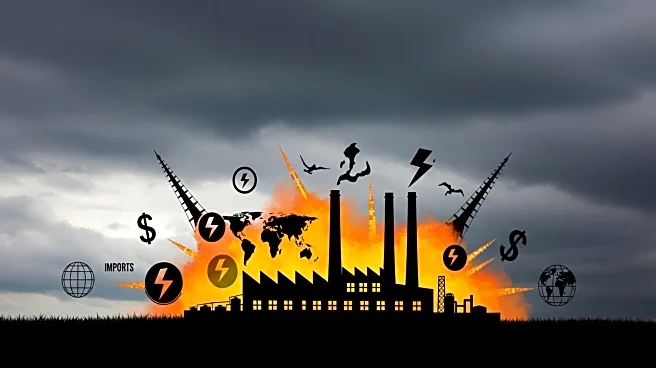What's Happening?
Ineos, a chemicals company owned by Sir Jim Ratcliffe, is set to cut 60 jobs at its East Yorkshire plant in Hull due to high energy costs and competition from low-cost imports from China. The company, which produces petrochemical products like acetic acid, has cited 'dirt-cheap' carbon-heavy imports from China as a major factor, claiming these imports are flooding the UK and European markets after being deterred from the U.S. by tariffs imposed by President Trump. Ineos has called for the UK government and European Commission to implement border levies to protect the industry, warning that without such measures, more sites could close, leading to further job losses. The Hull site, which recently received a £30 million investment to switch from natural gas to hydrogen, is Europe's largest producer of acetic acid and related products.
Why It's Important?
The job cuts at Ineos highlight the challenges faced by the UK chemicals industry amid global competition and rising energy costs. The influx of cheaper imports from China threatens domestic production, potentially leading to deindustrialization if protective measures are not implemented. The situation underscores the need for strategic government intervention to safeguard local industries and jobs. The transition to hydrogen at the Hull site reflects efforts to reduce emissions and improve sustainability, yet the economic pressures from international competition remain a significant hurdle. The broader impact on the chemicals sector could lead to a loss of skills and industrial capacity, affecting the UK's economic landscape.
What's Next?
Ineos is likely to continue advocating for tariffs and government support to protect its operations and the wider chemicals industry. The UK government and European Commission may face increasing pressure to address the competitive imbalance caused by imports from China. If protective measures are not enacted, further job cuts and site closures could occur, exacerbating the industry's challenges. Ineos's investment in hydrogen technology may serve as a model for other companies seeking to reduce emissions, but the economic viability of such initiatives will depend on broader market conditions and policy support.
Beyond the Headlines
The situation at Ineos reflects broader trends in global trade and industrial policy, where environmental considerations and economic competitiveness often clash. The reliance on coal-heavy imports from China raises questions about the environmental impact of global supply chains and the role of tariffs in promoting sustainable practices. The job cuts also highlight the social implications of industrial restructuring, with potential long-term effects on local communities and employment. As industries adapt to changing market dynamics, the balance between economic growth, environmental sustainability, and social welfare remains a critical challenge.








